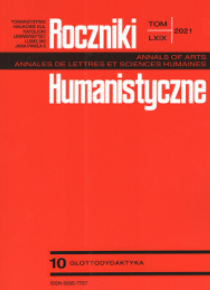EFEKT PLATEAU A BŁĘDY NA POZIOMIE INSTRUKCJI DYDAKTYCZNEJ
THE PLATEAU PHENOMENON IN LANGUAGE DEVELOPMENT VERSUS ERRORS AT THE LEVEL OF INSTRUCTION
Author(s): Eliza ChabrosSubject(s): Foreign languages learning, Lexis, Language acquisition, Pedagogy
Published by: Towarzystwo Naukowe KUL & Katolicki Uniwersytet Lubelski Jana Pawła II
Keywords: plateau effect; linguistic competence development; mistakes;
Summary/Abstract: A common problem faced not only by teachers in the glottodidactic process, but also by learners, is the plateau effect in language development. Despite many theories related to its causes, it is rarely mentioned that, to a large extent, the problem is caused by insufficient (as regards quantity) and inappropriate (as regards manner) vocabulary acquisition by the learner. Starting with the three-stage model presented by Mirzaei, Zoghi, and Davatgari Asl, and based on collected research material which involves selected mistakes made by B1+ and B2 learners (e.g. collocation and contextual mistakes, false friends, transferring word-formation patterns from the mother tongue to the target language), the author focusses on determining what kind of actions within the instruction stage (including didactic materials, teaching schedule, written assignments) may have a negative effect on the development of the linguistic skills of a student experiencing the plateau effect. The research results point to certain deficits in the didactic materials, which may perpetuate the stagnation. This can be prevented by increasing the number of drill exercises, appropriate selection of the lexical material, the introduction of idioms and collocations at elementary level, and constant supervision of the manner in which the language is used (the variety of linguistic measures and accuracy).
Journal: Roczniki Humanistyczne
- Issue Year: 69/2021
- Issue No: 10
- Page Range: 171-188
- Page Count: 18
- Language: Polish

